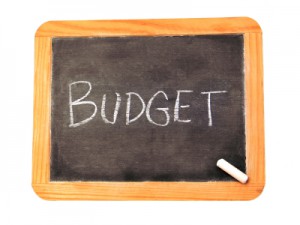David Larock in Mortgages and Finance, Home Buying
Developing a budget before taking on a mortgage is a crucial step that many first-time home buyers avoid like the plague. The excuses are legion: “I’m not a numbers person”, “It’s boring”, “I don’t know how”, “I’m afraid of what I will find” etc. As with many other things in life that are good for us, a little short-term pain is well worth it for the resulting long-term gain. In this case, the payoffs are more disposable income, faster debt repayment and an enhanced overall feeling of control. Done properly, budgeting gives you a much clearer understanding of the trade-offs you make on a daily basis, oftentimes without even knowing it, and in most cases, it also causes budgeters to willingly reprioritize their spending. The toughest part is getting started and to that end, I offer you a choice between The Easy Way and The Hard Way.
afraid of what I will find” etc. As with many other things in life that are good for us, a little short-term pain is well worth it for the resulting long-term gain. In this case, the payoffs are more disposable income, faster debt repayment and an enhanced overall feeling of control. Done properly, budgeting gives you a much clearer understanding of the trade-offs you make on a daily basis, oftentimes without even knowing it, and in most cases, it also causes budgeters to willingly reprioritize their spending. The toughest part is getting started and to that end, I offer you a choice between The Easy Way and The Hard Way.
In today’s world of plastic spending it’s not difficult to track where most of your money goes, assuming you save your monthly credit card and bank statements. The Easy Way to figure out your budget is to take your last six months of credit-card and debit charges and combine them with your monthly cash withdrawals. The longer the time horizon the more accurate your estimating will get because you will capture more one-time expenses, which often get missed with more basic budgeting tec hniques. The timing of one-off outlays such as car repairs, program enrollment fees, large retail purchases etc. can’t always be predicted but, over time, patterns emerge.
hniques. The timing of one-off outlays such as car repairs, program enrollment fees, large retail purchases etc. can’t always be predicted but, over time, patterns emerge.
This exercise probably won’t take you more than an hour and then it’s just a matter of comparing your total expenses to your income. (Feel free to use my online calculator called “Where Does My Money Go?” to consolidate your information in an easy-to-use report format.) At this point you’ll have a decent idea of how your money circulates and you can then compare your current shelter costs and discretionary income to your expected mortgage and home ownership costs. You’ll also have a good baseline to use when developing investment plans or deciding on major purchases such as cars and vacations in future. Not bad for an hour’s work.
As with other exercises, the more effort you put in, the greater the benefit, which bring us to the The Hard Way of budgeting. This is a more intensive approach that requires you to record, down to the last penny, how y ou spend money on a daily basis. The only hard part is having the discipline to do it day in and day out, because there is nothing particularly complicated about the exercise itself. The additional benefit gained in this methodical approach is that you become much more aware of where your money goes and, inevitably, some numbers will jump out at you. Whether it’s credit card interest, parking expenses, or the cost of buying lunch each day at work, you will be surprised at where you money goes. What’s more, a daily account of spending will also change the context in which you frame purchasing decisions. For example, don’t be surprised if you start thinking of expenses in terms of how many lattés things cost!
ou spend money on a daily basis. The only hard part is having the discipline to do it day in and day out, because there is nothing particularly complicated about the exercise itself. The additional benefit gained in this methodical approach is that you become much more aware of where your money goes and, inevitably, some numbers will jump out at you. Whether it’s credit card interest, parking expenses, or the cost of buying lunch each day at work, you will be surprised at where you money goes. What’s more, a daily account of spending will also change the context in which you frame purchasing decisions. For example, don’t be surprised if you start thinking of expenses in terms of how many lattés things cost!
Before you dismiss The Hard Way approach as being too intensive, consider this insight from a well-known book called “The Millionaire Next Door”, where the authors summarize twenty years of research on real-life millionaires to separate the myths of wealth accumulation from the reality. Their research showed that of the seven key factors that lead people to becoming millionaires, e mployment income ranks seventh while good saving habits tops the list as the single most important element. That means that spending wisely is more important to your long-term financial success than how much money you make. And in many cases, trimming some waste out of your daily budget is easier than you might think because once you understand how all of your spending fits together, you’ll start looking at individual purchases as trade-offs, rather than just as expenses that you either can or can’t afford in the here and now. Budgeting is the cornerstone of any financial plan and you’ll be amazed at the confidence and peace of mind that accrue when you do it well.
mployment income ranks seventh while good saving habits tops the list as the single most important element. That means that spending wisely is more important to your long-term financial success than how much money you make. And in many cases, trimming some waste out of your daily budget is easier than you might think because once you understand how all of your spending fits together, you’ll start looking at individual purchases as trade-offs, rather than just as expenses that you either can or can’t afford in the here and now. Budgeting is the cornerstone of any financial plan and you’ll be amazed at the confidence and peace of mind that accrue when you do it well.
David Larock is an independent mortgage planner and industry
insider specializing in helping clients purchase, refinance or renew
their mortgages. David's posts appear weekly on this blog (movesmartly.com) and on his own blog (integratedmortgageplanners.com/blog). Email Dave
September 23, 2010




